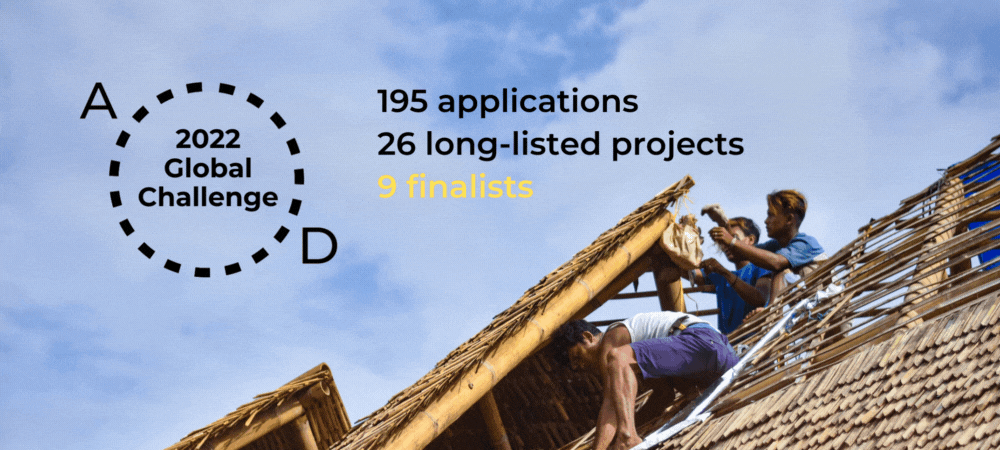
image source: Kakr Buluh Awar (Indonesia)
The Global Challenge highlights and celebrates the ongoing efforts of self-built community-led initiatives world-wide, and offers them the stage they deserve whilst connecting partners and collaborators that they otherwise have no access to.
On February 15, 2023, Architecture-in-Development announced the finalists for the 2022 edition of the Global Challenge. From the 195 applications we received, 59 eligible entries have been published on the A--D website. From this list, 26 longlisted projects were whittled down to nine finalists by our jury: Johann Baar (The Hilti Foundation), David Barragan (Al Borde Arquitectos), David Basulto (Archdaily), Ole Bouman (Design Society), David Cole (Building Trust International), Kira Intrator (Aga Khan Development Network), Irene Planchuelo Gómez (TECHO Internacional), Doina Petrescu (University of Sheffield), Rob Breed and Changfang Luo (Architecture-in-Development).
When judging each project, the core team’s capacity and community involvement were given extra attention. We judged carefully whether professionals established community trust, and whether the project was born from the needs and aspirations of the local community.
These considerations are the foundation for Do-it-Together architecture that Global Challenge facilitates. Only when the core team is consolidated, can we help connect external partners and supporters to contribute to the process of meaningful development.
Going further, the nine finalists were selected not only for their long-term vision and impact but also for how they collectively applied diverse approaches in their own context, celebrating a core tenet of Do-it-Together architecture.
⇧ San Blas Social Action Center (Venezuela) is led by a social organization, joined by a group of spatial experts. It is about a process: a process of transforming a neighborhood dump site where architecture became the means for place-making and the reason for community action.
⇧ Book House (China) was born from a close collaboration between local carpenters and design professionals. Rather than a one-off effort, it aimed to create a network of children's libraries. The professionals learn from local, vernacular know-how and develop a viable, scalable approach to restore the cultural identity of villages during China's unprecedented urban growth.
⇧ Barrios que Cuidan (Peru) was an initiative started by neighborhood leaders and a womens’ organization, joined by social workers and a group of architects and sociologists. By providing a place for the existing cooking activities, it celebrates and empowers the care-takers (often low-income, single mothers, female migrants etc.) to become active leaders in improving the food and social resilience of their communities.
⇧ The Women's House of Imloul (Morocco) was initiated by a local women’s association, joined by a group of international professionals. The process of collaboration creates a testing ground where modern and vernacular know-how encounter and learn from each other. The project will not only improve womens’ economic opportunities but also tackle ongoing desertification in the region.
⇧ KuNa, Construyendo Sueños (Nicaragua) is an endeavor by a multidisciplinary team of local craftsmen and international experts. It proposes a scalable approach that provides not only houses but also the life-changing skills and tools to communities for building their future homes sustainably.
⇧ Kakr Buluh Awar (Indonesia) is a collaboration between the leaders of the village and design professionals, involving local communities in building a church as well as in the process of restoring the once forgotten bamboo supply-construction chain. The project has successfully improved villagers' economic opportunities while reviving the culture and tradition of the place.
⇧ La Villa Pesquera del Crash Boat (Puerto Rico) was initiated by a multidisciplinary team of local fishermen association, legal, design-planning and coastal experts, to restore the fisher’s village which was damaged by a hurricane in 2017. Through advocacy and master planning, the project catalyzes a process of restoring the identity, culture and economy, strengthening the resilience of the local community.
⇧ The Baitussalam School (Pakistan) is a joint initiative by a local NGO and architects, providing a school for the children who lost access to education due to flooding in 2022. Besides the physical school, it also aims to introduce communal farming to increase the long-term food self-sufficiency of the community.
⇧ Mini-Cyclone Shelter for Vulnerable Communities (Bangladesh) is a participatory housing development involving local families, government, community architects and experts of a local NGO. Besides building safe homes, it also provides shelter for communities to gather during cyclones, increasing both social and climate resilience among the coastal and riverine communities.
- -
All the finalist teams are now calling for financial support as well as a variety of expertise, in-kind donation and helping hands. Please check each project, get in touch with the project team leader and help spread their call.
The finalist teams will kick off the accelerator at the beginning of March followed by workshops. You can also get in touch with Changfang or Rob to discuss ways of supporting the Global Challenge finalists.